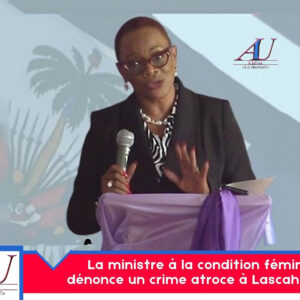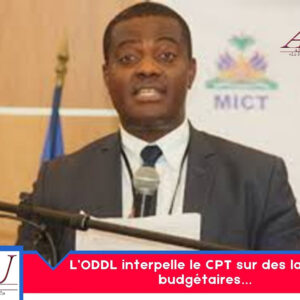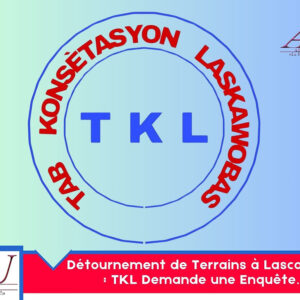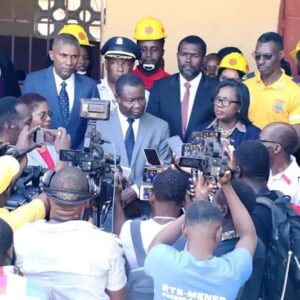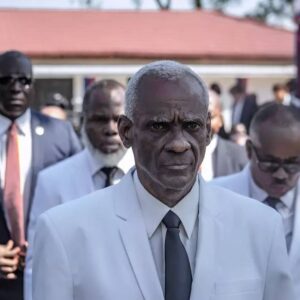Summary: Global Press Journal takes you, through powerful personal stories and detailed data, to the heart of the four corners of the world and discover the unpublished stories of 11 local journalists and activists, each of whom embraces courage.
Reporter Byline: Anne Myriam Bolivar, GPJ Haiti
Photo Caption: Lovelie Stanley Numa
A Haitian journalist experienced the assassination of her colleagues. After demonstrating to demand justice, she fears she will be the next prey.
Photo Credit: Anne Myriam Bolivar, GPJ Haiti
Article
“This article was originally published by Global Press Journal »
This year, Haiti fell 29 places in the world press freedom rankings, making it one of the countries in the world that has suffered a sad record of decline, according to Reporters Without Borders. In fact, in 2022, the Inter-American Press Association designated Haiti as a country that “remains the least safe, most dangerous and most fragile for the exercise of press freedom.”
The challenges facing the press in Haiti cannot be dissociated from the broader socio-political dynamics of the country. Political instability, social unrest and gang violence have created an environment in which journalists face relentless threats, attacks and intimidation – and are even killed – due to of their work, as evidenced by several high-profile incidents. In July 2020, Setoute Yvens, a journalist at Radio Télé Mégastar, survived an assassination attempt, while journalist Pradel Alexandre received death threats from an alleged leader of a criminal gang because of his reports. In 2022, Maxiben Lazarre, a journalist affiliated with the digital media group Roi des Infos, was killed in Port-au-Prince while covering a protest by textile workers demanding higher wages. At least six journalists have been killed in 2022 alone.
In addition to pressing safety and security issues, journalists in Haiti face numerous obstacles that make their work difficult, including difficulties accessing information, insufficient financial resources and lack of institutional support.
Faced with this hostile environment, some journalists were forced to abandon the profession altogether, while others resorted to survival strategies such as working from home, as Lovelie reveals Stanley Numa, a journalist based in Port-au-Prince, Haiti, in his interview with Global Press Journal. Lovelie Stanley Numa experienced the assassination of her colleagues, while others mysteriously disappeared. For her, “there can be no democracy without freedom of the press”. Here she gives us her story.
My name is Lovelie Stanley Numa. I am a journalist in Port-au-Prince, Haiti.
I started my journalism career in 2015 working for a local radio station. I then worked for other media outlets, covering topics as varied as, among others, politics, human rights, health and social and environmental issues.
Throughout my career, I have faced several obstacles. For example, I was verbally threatened by political activists when I went into the field to conduct interviews on political issues. The population’s lack of awareness of the work of journalists often results in verbal or physical attacks, and sometimes in a refusal to be interviewed. Journalists are being murdered in Haiti, but these assassinations have not yet been solved.
Lovelie’s story – video
“I received several messages whose authors threatened to kill and rape me.” –Lovelie Stanley Numa
In 2019, following the assassination of one of our colleagues, we formed a small group to organize a peaceful march to demand justice. I subsequently received several messages whose authors threatened to kill and rape me. I lived in this situation for about a year. I only went out when it was for a very important reason. Although I complained to the authorities and organizations defending journalists’ rights, no one wanted to help me. During this period, I was separated from my child, who had to go live with one of her aunts. I had to change apartments every six months. All of this was not without consequences on my mental and physical health.
Due to the time spent at home and the deterioration of the economic, political and social situation in the country, the idea came to me to create my own online media and resort to teleworking. I have many journalistic projects on hold because they require going into the field while certain regions are difficult to access.
What do you mean by freedom of the press? – audio
I have always been concerned about the risks of the profession. I saw colleagues being murdered. Others are missing. The fact that I was among the journalists who organized the silent march to demand justice for my colleague’s family, I was threatened by people who protected the government in place at the time. Given the insecurity that Haiti is experiencing, the situation is only getting worse.
Despite these challenges, doing this job and keeping the public informed about what is happening in the country gives me a sense of pride. I also have the chance to work remotely, which allows me to pursue my career while remaining safe. I learned to be more careful.
A lot has changed between 2015 and 2023. It’s rare that I find journalists I knew in this sector. Being threatened, many of them left the country. The few journalists who remain are forced to work from home and others are trying their hand at international media.
Newsrooms must protect journalists by providing them with security training and safety equipment, such as bulletproof vests and gas masks, and by working closely with rights organizations. journalists. It is important for citizens to also support press freedom by staying informed, supporting press freedom organizations, and holding their leaders accountable and transparent.
In Haiti, there are restrictions on coverage of certain topics, such as corruption, politics, human rights and criminal activity. We lack the courage to cover these sensitive topics. Most recently, our work has been very limited, partly because not a day goes by without the gangs gaining ground.
The effects of restricting press freedom are serious. Journalists risk finding themselves insecure and losing their freedom, and citizens, too, risk being deprived of their right to information. Without freedom of the press, there can be no democracy.
This interview has been edited and condensed for clarity
“Global Press Journal is an international, award-winning, nonprofit publication that employs local women journalists in more than 40 independent news outlets across Africa, Asia and Latin America.”

